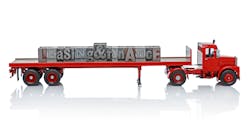Delays in getting new trucks, rising fuel costs, higher maintenance costs, difficulty finding technicians, increased complexity of diesel-powered vehicles, the ascension of alternative-fueled vehicles. Those are just some of the issues that private fleets face today.
I was speaking with NationaLease President Dean Vicha the other day about all these challenges. While navigating them is difficult for for-hire carriers, private fleets can be overwhelmed by them since they are not in the transportation business.
Now seems like a good time for private fleets to consider moving from the ownership model for their capital assets into a full-service lease mode. This makes sense, according to Vicha, for several reasons.
See also: Rising parts costs make strategic sourcing critical
Typically, full-service leasing organizations have a strong bandwidth as to which truck specs work best in any given duty cycle. These organizations also have purchasing power that allows them to acquire capital assets and even parts at favorable prices compared to what a private fleet typically could negotiate on its own. Full-service leasing companies also have a support network that can service trucks when they are away from home base.
Switching to a full-service leasing organization also relieves a private fleet of the burden of having to hire and train its own service technicians. The industry already is facing a shortage of technicians, and the shortfall is likely to get worse if predictions from the U.S. Bureau of Labor Statistics (BLS) are correct. The agency believes that more than 28,000 new technicians will be needed every year over the course of the next decade.
Also complicating the technician picture: Trucking is moving toward a greener future with alternative-powered vehicles—hybrids, hydrogen fuel-cell electrics, and battery electrics. Training technicians to work on battery-electric and hydrogen fuel cell-powered commercial vehicles is going to be costly, as will the added costs of the tools and diagnostic equipment needed to work on these alt-vehicles.
Shifting from an ownership model to an outsourced full-service leasing model will allow private fleets to focus on their core competency and still deliver a high level of service to their customers.
Jane Clark focuses on managing the member services operation at NationaLease as vice president of member services. She works to strengthen member relationships, reduce member costs, and improve collaboration within the NationaLease supporting groups.
About the Author
Jane Clark
Senior VP of Operations
Jane Clark is the senior vice president of operations for NationaLease. Prior to joining NationaLease, Jane served as the area vice president for Randstad, one of the nation’s largest recruitment agencies, and before that, she served in management posts with QPS Companies, Pro Staff, and Manpower, Inc.
